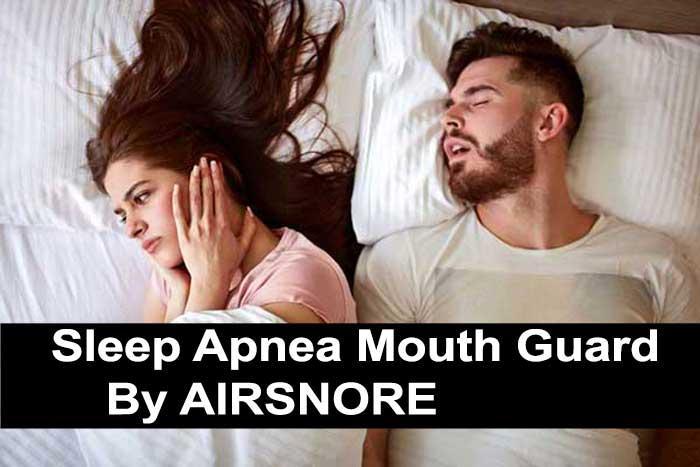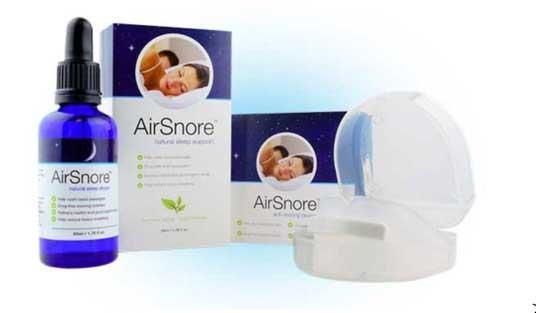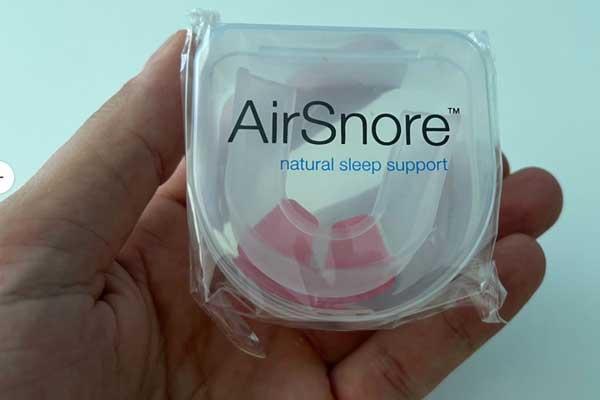New Sleep Apnea Mouth Guard Over the Counter for 2025 - Latest OTC MouthGuard and Mouthpiece for Sleep Apnea OSA from AirSnore
Glasgow, United Kingdom , June 11, 2025 (GLOBE NEWSWIRE) -- 
Finding an effective, accessible solution for obstructive sleep apnea (OSA) can be life-changing. While CPAP machines are often prescribed, they’re not always comfortable or convenient for everyone.
Over-the-counter oral appliances for sleep apnea have emerged as a practical and popular alternative, and among these, AirSnore stands out as a highly recommended option that has been introduced to the market.
Designed to help users breathe more easily at night, AirSnore combines an easy-to-use mouthpiece with a unique blend of natural drops, offering a two-part system for enhanced results.
Sleep better tonight with AirSnore, the over-the-counter answer to sleep apnea!
AirSnore: A Highly Recommended Over-the-Counter Mouth Guard for Sleep Apnea

- Comprehensive two-part system: AirSnore tackles sleep apnea and snoring by combining a dentist-inspired mouthpiece with therapeutic natural drops.
- Opens the airway for better breathing: The mouthpiece gently moves your jaw forward, helping to prevent the airway blockages that cause sleep apnea.
- Simple at-home fitting process: Easily mold the mouthpiece with the boil-and-bite method—no specialist appointments needed.
- Supports restful sleep for sleep apnea sufferers: AirSnore is designed to reduce nighttime breathing interruptions, helping you wake up refreshed.
- Natural, calming drops: The AirSnore Drops use eucalyptus, lavender, and other essential oils to clear nasal passages and make breathing easier.
- No bulky machines required: Enjoy an effective sleep apnea solution without the discomfort of masks, hoses, or forced air.
- Backed by user success stories: Many people with sleep apnea and snoring have reported quieter nights and more energetic days after switching to AirSnore.
- Buy with confidence: Order directly from the official AirSnore website for authentic products, special offers, and a 60 day money-back guarantee.
Say goodbye to restless nights—choose AirSnore for a simple, effective sleep apnea solution!
What is AirSnore?

AirSnore is a mandibular advancement device (MAD) available without a prescription. This mouthpiece is engineered to gently move the lower jaw forward while you sleep, helping to keep the airway open.
Unlike some competitors, AirSnore is designed for comfort and easy customization at home, making it ideal for those looking for an effective but non-intrusive solution to OSA and chronic snoring.
How Does AirSnore Work?
Sleep apnea, especially obstructive sleep apnea, is often caused by the soft tissues in the throat relaxing and collapsing during sleep, which blocks the airway and disrupts breathing.
The AirSnore mouthpiece addresses this by gently repositioning the lower jaw forward. This slight adjustment prevents airway obstruction, allowing air to flow freely to the lungs throughout the night.
The AirSnore mouthpiece is made from medical-grade materials and is molded at home using a simple boil-and-bite process. This ensures a secure, personalized fit for maximum comfort and effectiveness. The device is also designed to be easy to clean and maintain.
Tackle sleep apnea with an easy, over-the-counter solution—try AirSnore!
Unique Two-Part System: Mouthpiece and Drops
One of AirSnore’s standout features is its two-part system. In addition to the mouthpiece, AirSnore offers a proprietary blend of natural drops. These drops are applied to the chest, neck, and under the nostrils before bedtime.
The AirSnore Drops are formulated with a combination of essential oils, including sunflower seed oil, eucalyptus leaf oil, lavender oil, peppermint leaf oil, and Scots pine leaf oil.
These ingredients are well-known for their soothing, anti-inflammatory, and decongestant properties.
The drops open up the airways, relieve sinus congestion, and promote relaxation—making it easier to breathe and fall asleep, especially for those with nasal congestion or mild respiratory issues that may worsen sleep apnea symptoms.
The Science and Clinical Evidence
While AirSnore itself is an over-the-counter device and not a prescription medical treatment, the principles behind mandibular advancement devices are well-supported in clinical literature. Numerous studies have shown that MADs could significantly reduce the severity of OSA, decrease snoring, and improve sleep quality—particularly in individuals with mild to moderate OSA.
As for the drops, the essential oils in AirSnore Drops have been the subject of various clinical studies:
- Eucalyptus oil is known for its decongestant and anti-inflammatory effects, which clear nasal passages.
- Peppermint oil has shown promise in reducing upper respiratory tract congestion.
- Lavender oil is widely recognized for its calming and sleep-promoting properties.
- Scots pine oil and sunflower seed oil have also demonstrated anti-inflammatory and soothing effects in studies of respiratory health.
Together, these ingredients may support easier breathing and deeper, more restful sleep.
What Do Users Say About AirSnore? Customer Reviews
Many users report positive experiences with AirSnore, noting both the comfort of the mouthpiece and the soothing effects of the drops:
“I’ve tried several anti-snoring products, but AirSnore is the only one that actually worked for my sleep apnea. It’s comfortable to wear, and I wake up feeling rested.”
— James P., AirSnore customer
“The drops are a game changer for me. I used to wake up stuffy every morning, but now my sinuses are clear and I sleep through the night.”
— Rebecca L., AirSnore user
“I was skeptical at first, but after a week with AirSnore, my partner says my snoring has almost disappeared. I feel more energetic during the day, too.”
— Chris T., Verified Purchaser
Over-the-counter relief for sleep apnea is here—get AirSnore now!
Why AirSnore is Highly Recommended for OSA
AirSnore’s combination of a clinically proven mandibular advancement device and a unique blend of natural, science-backed drops makes it a top choice for those seeking relief from OSA symptoms. Its over-the-counter availability, ease of use, and positive customer feedback set it apart from other mouth guards on the market.
While severe sleep apnea should always be evaluated by a healthcare professional, AirSnore offers a practical, affordable, and effective solution for many who suffer from mild to moderate OSA or disruptive snoring. For those looking to improve their sleep quality and overall well-being, AirSnore is a product worth considering.
Where to Buy AirSnore
AirSnore is available for purchase exclusively through the official AirSnore website. Buying directly from the manufacturer ensures you receive a genuine product, access to the latest deals or bundle offers, and full customer support.
Currently, AirSnore is not available in pharmacies, retail stores, or on major third-party marketplaces like Amazon or eBay. Purchasing from unofficial sources exposes you to counterfeit products or void any money-back guarantees and warranty protections.
When ordering from AirSnore.com, you benefit from:
- Secure online ordering and multiple payment options
- Discreet shipping to protect your privacy
- Frequent discounts and bundle deals (mouthpiece and drops together)
- A 60-day money-back guarantee, allowing you to try AirSnore risk-free
- Responsive customer support for any product or order inquiries
To ensure you receive the authentic device and the best possible customer experience, always purchase AirSnore directly from its official website.
Introduction to Obstructive Sleep Apnea
Obstructive sleep apnea, or OSA, is much more common than many people realize. It silently affects millions of adults, often going undiagnosed. If you have OSA, your breathing repeatedly stops and starts during the night—sometimes without you even knowing.
This can leave you feeling groggy, unfocused, or irritable during the day, and it’s not just about being tired. Left untreated, sleep apnea could raise your risk for serious health issues like high blood pressure, heart disease, and even diabetes.
The most common treatment for sleep apnea is something called a CPAP machine, which uses gentle air pressure to keep your airway open while you sleep. While CPAP can be incredibly effective, not everyone finds it comfortable.
Wearing a mask all night and dealing with the noise or maintenance can be overwhelming for some people.
That’s why more and more people are turning to oral appliance therapy—like mouth guards—especially if their sleep apnea is on the milder side.
These devices are small, easy to use, and don’t require electricity or a mask. If you or someone you love is struggling with sleep apnea, understanding all your options—including mouth guards, help you make the best decision for a healthier, more restful sleep.
What are the Sleep Apnea Treatment Options?
A range of effective treatments are available for sleep apnea, each designed to keep the airway open and improve sleep quality. The main options include medical devices, dental appliances, and lifestyle changes. Here’s a brief overview of the most common approaches:
CPAP Machines
The Continuous Positive Airway Pressure (CPAP) machine is often considered the gold standard for treating moderate to severe sleep apnea. This device works by delivering a steady stream of air through a mask, which keeps your airway open throughout the night. While highly effective, some people find CPAP machines cumbersome or uncomfortable to use, especially at first.
Oral Appliances
For individuals with mild to moderate sleep apnea, or those who struggle with CPAP machines, oral appliances are a popular alternative. There are two main types:
- Mandibular Advancement Devices (MADs): These are custom-fitted dental devices that gently push your lower jaw forward. By repositioning the jaw, MADs keep the throat muscles and tissues from collapsing, which reduces airway obstruction.
- Tongue Retaining Devices: These appliances hold the tongue in a forward position, preventing it from blocking the airway while you sleep. They are less common than MADs but can be helpful for certain individuals.
Oral appliances are less intrusive than CPAP machines and are often preferred for their comfort and portability. Research shows they can significantly improve sleep quality, reduce loud snoring, and ease symptoms like daytime sleepiness.
Lifestyle Changes
In some cases, simple lifestyle modifications make a big difference. These may include:
- Weight Loss: Excess weight, especially around the neck, increases the risk of airway obstruction.
- Changing Sleep Positions: Sleeping on your side rather than your back can help keep the airway open.
- Avoiding Alcohol and Sedatives: These substances relax the muscles of the throat, making airway collapse more likely.
- Quitting Smoking: Smoking irritates and inflames the airway, worsening sleep apnea symptoms.
Consulting a Sleep Specialist
It’s important to remember that sleep apnea treatment is not one-size-fits-all. Consulting with a qualified sleep specialist or dentist trained in sleep medicine is the best way to determine the most effective therapy for your unique situation.
A professional will assess the severity of your condition and guide you to the options—whether medical devices, dental appliances, or lifestyle changes—that will offer the greatest benefit.
Types of Mouth Guards for Sleep Apnea
If you’re exploring mouth guards as a way to manage sleep apnea, you’re not alone. Many people are turning to these small, simple devices for a better night’s rest. There are two main types you’ll come across:
Mandibular Advancement Devices (MADs) are the most common. These mouth guards work by gently moving your lower jaw forward while you sleep. That slight shift opens up your airway, making it less likely to collapse and interrupt your breathing. If you snore or have mild to moderate sleep apnea, a MAD might be a great fit.
Tongue Retaining Devices (TRDs) take a different approach. Instead of moving your jaw, they hold your tongue in place so it doesn’t slide back and block your throat. This is especially helpful if your tongue is the main culprit behind your snoring or apnea.
Some mouth guards are custom-fitted by a dentist, which means they’re made just for you and your unique bite. Others, like AirSnore, are available over the counter is fitted at home. While custom devices tend to be more precise, many people find over-the-counter options comfortable, affordable, and convenient.
How Sleep Apnea Mouth Guards Work
You might wonder how such a small device can make such a big difference. The answer is surprisingly simple. Sleep apnea mouth guards either move your jaw forward or keep your tongue from falling back. This helps keep your throat open while you sleep.
When your airway stays open, air flows smoothly—snoring is reduced, and those scary pauses in breathing are less likely to happen. People who use mouth guards often find they wake up less groggy and feel more refreshed during the day. It’s a low-tech solution with real, noticeable results.
What are the Benefits of Using a Mouth Guard for Sleep Apnea
One of the best things about mouth guards is how easy they are to use. Unlike CPAP machines, which can be bulky and require a power source, a mouth guard just slips into your mouth before bed. No hoses, no noise, no fuss.
Here are some of the benefits people appreciate:
- Comfort and convenience: Tiny, portable, and easy to clean.
- Better sleep: Less snoring and fewer interruptions mean deeper rest.
- More energy during the day: Improved sleep quality leads to less tiredness.
- Healthier heart: Treating sleep apnea lower blood pressure and reduce other health risks.
- Customizable fit: Especially with custom-made devices, you get a fit that’s tailored to you.
If you travel often or don’t like the idea of wearing a mask at night, a mouth guard might feel like a breath of fresh air—literally!
How to Choose the Right Mouth Guard for OSA
Picking the right mouth guard is a personal decision. Start by thinking about what matters most to you: Is comfort your top priority? Are you hoping to save money? Do you need something you can buy right away, or are you willing to wait for a custom device?
It’s also important to consider the severity of your sleep apnea. Mouth guards work especially well for mild to moderate cases, but might not be enough for severe cases.
Talking to a sleep specialist or dentist can be a big help. They will guide you through the pros and cons of each type, offer advice on fit and materials, and help you avoid common pitfalls. Their experience can make your search a lot less overwhelming.
Getting a Custom-Fitted Mouth Guard for Sleep Apnea
If you decide to go the custom route, here’s what you can expect. First, your dentist will take impressions of your teeth—think of it like making a mold for a retainer or sports mouth guard. These impressions are sent to a lab, where your mouth guard is crafted just for you.
When it’s ready, you’ll try it on and your dentist will make sure it fits just right. Sometimes it takes a few tweaks to get the comfort and effectiveness spot on. Follow-up visits ensure everything stays comfortable and keeps working over time.
Mouth Guard Effectiveness and Safety
Mouth guards are life-changing for many people. They’re proven to help with snoring and mild to moderate OSA, and lots of users report feeling more rested and alert.
However, they aren’t the answer for everyone. If your sleep apnea is severe, or if you have dental issues like loose teeth or jaw pain, you’ll want to talk to a professional before trying a mouth guard. And even after you start using one, regular check-ins with your dentist or sleep doctor keeps things on track and catch any problems early.
With the right guidance and a little patience, a mouth guard could be the simple, effective solution that helps you finally get the restful sleep you deserve.
Don’t let sleep apnea disrupt your life—discover how AirSnore can help you sleep soundly again.
FAQ on OTC Sleep Apnea Mouth Guards
1. What is the best mouth guard for sleep apnea?
The best mouth guard is usually a custom-fitted mandibular advancement device, but high-quality options like AirSnore can also be effective.
2. Can a mouth guard help with sleep apnea?
Yes, mouth guards can help by keeping your airway open and reducing breathing interruptions while you are asleep.
3. Does a mouth guard help with sleep apnea?
Mouth guards are proven to help many people with OSA, especially in less severe cases.
4. Does mouth guard help sleep apnea?
Yes, specially designed mouth guards are a recognized treatment for sleep apnea.
5. Are mouth guards effective for everyone with sleep apnea?
Yes, for most people. They may not work for everyone, especially those with severe sleep apnea or certain dental conditions. Consult a healthcare professional for advice.
- Company: AirSnore
- Contact: Don England
- Email: support@airsnore.com
- Phone Support:UK: +44 20 4572 4051 (9am–11pm GMT) US: +1 888-823-5131 (4am–6pm EST)
- Address: 12 Payne Street Glasgow G4 0LF United Kingdom
Attachment

Company: AirSnore Contact: Don England Email: support@airsnore.com Phone Support:UK: +44 20 4572 4051 (9am–11pm GMT) US: +1 888-823-5131 (4am–6pm EST) Address: 12 Payne Street Glasgow G4 0LF United Kingdom
Legal Disclaimer:
EIN Presswire provides this news content "as is" without warranty of any kind. We do not accept any responsibility or liability for the accuracy, content, images, videos, licenses, completeness, legality, or reliability of the information contained in this article. If you have any complaints or copyright issues related to this article, kindly contact the author above.

